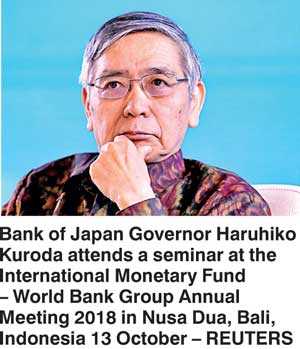Tuesday Feb 24, 2026
Tuesday Feb 24, 2026
Monday, 15 October 2018 00:00 - - {{hitsCtrl.values.hits}}
 NUSA DUA, Indonesia (Reuters): Escalating trade tension, emerging market turbulence and huge debt piling up in some countries pose risks to the world economy, Bank of Japan Governor Haruhiko Kuroda said on Sunday, his strongest warning to date over a darkening global outlook.
NUSA DUA, Indonesia (Reuters): Escalating trade tension, emerging market turbulence and huge debt piling up in some countries pose risks to the world economy, Bank of Japan Governor Haruhiko Kuroda said on Sunday, his strongest warning to date over a darkening global outlook.
US President Donald Trump’s ‘America First’ policies and escalating Sino-US trade frictions have overshadowed a weekend meeting of G20 finance leaders, many of whom expressed concerns over the harm to global growth from trade conflict.
Kuroda urged global policymakers to continue their dialogue with a “renewed recognition on the importance of free trade,” warning that further escalation of protectionism would harm trade, business confidence and global growth.
“The recent rise of protectionist moves and tightening of financial conditions in some economies remind policymakers of the importance of being vigilant at all times,” Kuroda told a seminar on the side-lines of the annual meetings of the International Monetary Fund and World Bank in Indonesia.
“We should pay more attention to protectionist moves, as global economies have become increasingly interdependent through global value chains,” he said.
In Japan, a scheduled domestic consumption tax hike next year is unlikely to inflict major damage to the economy, he added, rebuffing the views of some analysts that the increase ought to be postponed to ensure a sustained recovery.
“At this stage, there would not be any major negative impact on the economy,” Kuroda said after the weekend gathering of G20 finance leaders, as the hit to growth from next year’s tax hike would be “much, much smaller” than from an increase in 2014.
Prime Minister Shinzo Abe has pledged to proceed with a sales tax hike to 10% from 8% in October next year. The plan was postponed twice after the previous hike to 8% from 5% pushed the economy into recession.
Kuroda also called for vigilance over market developments, after last week’s market rout sent global stocks tanking on fears about prospects of slowing world growth.
“For now, severe market stress has been limited in certain economies,” as emerging economies have sufficient buffers against market turbulence, he added.
“But more attention is being directed to economies that accumulated a substantial amount of debt. Political risks, including the rise of trade tensions are coming to the forefront as well.”